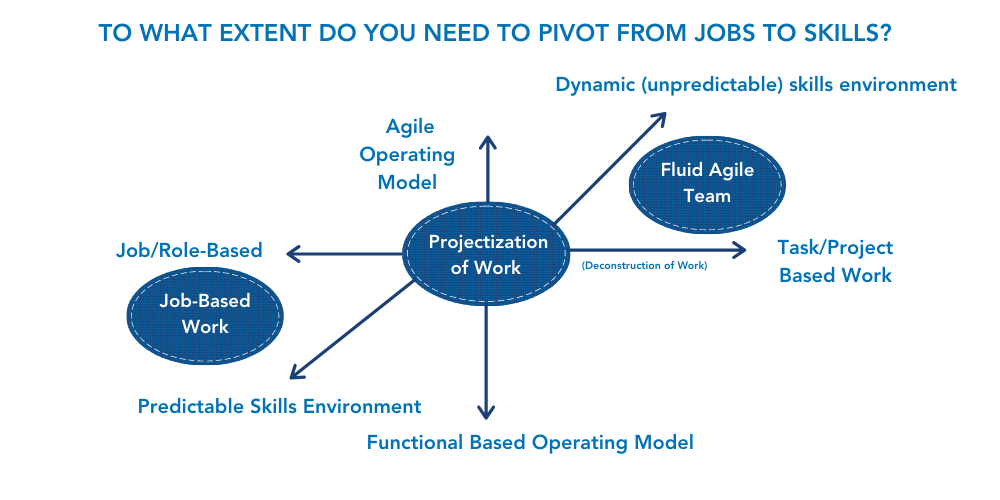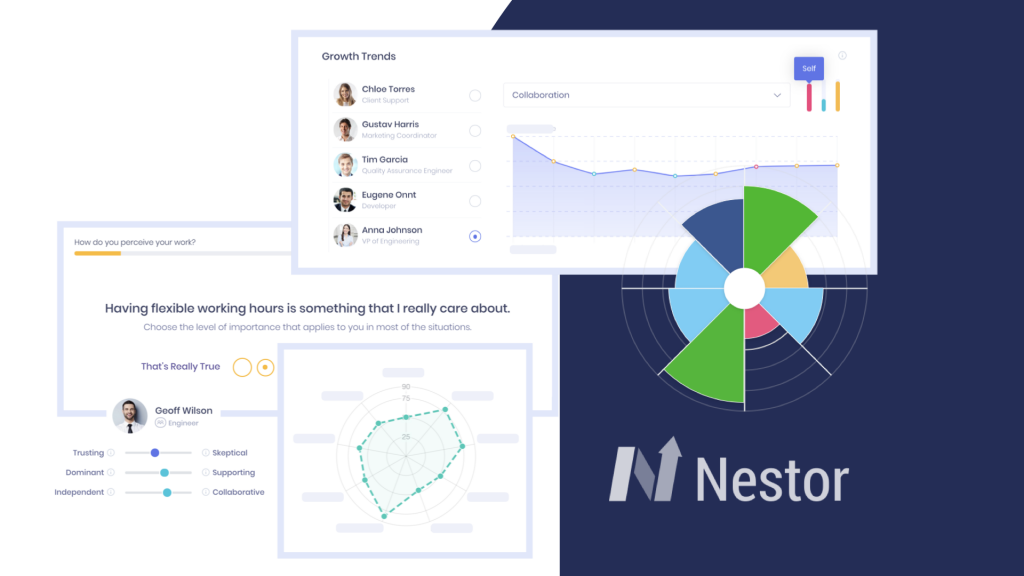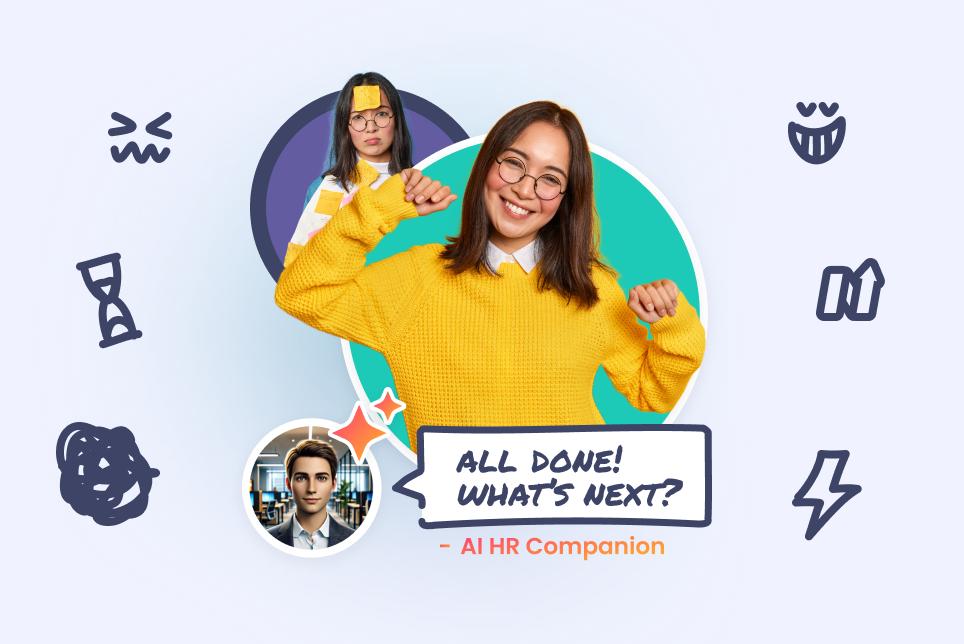
In today’s world, challenges are more diverse than ever, and skills-based organizations might be the answer. As a result of the pandemic, people are working from anywhere in a more dynamic way. They also have different expectations when it comes to their development paths and mission inside an organization, especially the younger generations.
Work practices have also evolved and include new models starting with the gig economy, freelancing, and the integration of contingent workers. The accelerated pace of new technology adoption like machine learning, automation, or AI-enhanced tools has disrupted in unprecedented ways how people work and interact.
Therefore, new business and work models are arising, and many organizations have switched to digital environments adding a strong technology component to their core business. A high-profile example of a company that has publicly announced its switch from telecom to a tech company is Vodafone.
As bold and visionary as these moves might be, they come along with challenges in talent acquisition, the preparation of the existing employees for the digital transformation, and ensuring their current and future required skills are met through continuous learning and mentorship programs. And skills-based organizations seem to be the key to addressing these challenges by redefining traditional talent management practices and replacing them with skills-based models.
Moreover, some jobs that involve repetitive tasks are being fully automated and on the verge of disappearing while other roles — the more sophisticated ones that require higher-skilled individuals and decision-making — are taking the spotlight.
As the World Economic Forum study shows, by 2025, 85 million jobs may be displaced by a shift in the division of labor between humans and machines — but 97 million new roles may emerge.
In the new context, the classical job approach seems obsolete. Instead, the more dynamic and flexible approach to addressing these changes, which places skills and human capabilities at the heart of talent strategies is taking the ground. Organizations that function on these principles are what we call today skills-based organizations.
In this new context, characterized by disruptions and fast market shifts, skills and skills-based organizations have surfaced as the solution to drive the agility organizations need to stay competitive and to adapt rapidly to unknown situations.
Let’s deep dive into the importance of skills-based talent models and explore what skills-based organizations are and what advantages they bring.
Transitioning from jobs to skills: the importance of skills-based practices
As the well-reputed senior research scientist, John Boudreau, expressed himself, putting skills at the center of people strategy allows organizations “to deal with the whole person and the capabilities they have rather than being limited to dealing with them only as they match or don’t match a job description.”
Looking from a different perspective, skills are the common language that unites people, roles, work models, opportunities in the workplace, and personal capabilities, goals, and interests that may change over time.
For example, bringing innovation and agility in the new hybrid workplace, especially to enterprise-level organizations may require new ways of collaboration and organizing teams and new roles that can’t be defined by the fixed limit of a job description. Instead, accessing and developing employees through skills-based approaches allows companies to build an adaptable and flexible workforce.
Furthermore, relying solely on a job description might help you to identify the best candidate match based on a set of skills needed. However, it won’t solve the most pressing issue of identifying the skills and competencies necessary to drive the company forward.
What are skills-based organizations?
Skills-based organizations are the ones that truly understand the urgency to act in anticipation of the future. Nearly one in three skills needed in 2018 were no longer needed in 2022, as predicted by Gartner. This fact illustrates just how rapidly skills needs can evolve and change.
Difficult as it may seem to predict the skills needed for tomorrow’s world of work, some of the natural first steps for future-ready skills-based organizations might be to:
- assess the current level of competencies within the organization
- identify the existing gaps in skills and proficiency levels
- begin upskilling and reskilling in an ongoing way
Also, for some new roles that require rare or newly emerged skills, this new approach encourages us to look more holistically at employees from multiple angles. We can use an internal talent marketplace to identify what kind of employee profile has the greater potential to move into a new role, who has the necessary motivation, and what it takes to get there.
So, the way forward is to focus on people’s skills and capabilities sustained by analytics and data and bring transparency into the process by encouraging people to assert themselves and take an active part in their development plans. These actions represent the foundation of skills-based organizations.
But to do that you need to consider skills as the basis of any coherent talent strategy, including:
- hiring
- workforce planning
- performance
- career development
- learning
- compensation
Skills are not only linked to learning programs but also to performance. The more up-to-date people’s skills are, the more productive people will be with direct results in business outcomes. Knowing what skills you have inside the organization, and understanding where you want to go in the future is the first step in developing customized plans for each employee.
The main advantages of skills-based organizations
1. Gaining agility and business resilience in an unpredictable environment
Companies that operate in highly competitive and specialized market segments cannot rely on rigid job frameworks. Relying instead on skills that are directly linked to the dynamic nature of business fuels agility and drives innovation.
On top of that, these companies have to forge new ways to develop and retain the most talented and high-performing people. A way to do that is to offer more autonomy and design more flexible jobs and career paths that reflect the personal needs, interests, and goals of each employee.

2. Better resource allocation and higher profitability margins
If workforce skills fail to keep pace with business needs and digital transformation, this will:
- impact productivity levels
- create frustration among employees, who will eventually leave the company
- negatively influence the overall competitiveness in the market
This is why it is important to continuously map and assess skills gaps from multiple perspectives. From the feedback received from peers and direct managers to self-assessments and performance reviews, while taking into consideration the competency levels needed for the actual job role and the future ones.
This approach enhances resource allocation activities by empowering organizations to align the right resource with the right skills to the needs of a given activity or engagement.
3. Personalized career and learning paths based on people’s interests and capabilities
Workforce development has become increasingly important in today’s competitive landscape. Uncovering development paths and personalized learning and mentorship programs with the help of analytics and intelligent nudges is an effective way to:
- improve employee performance and engagement
- increase productivity and efficiency
- reduce employee turnover and improve morale
4. Transparency over skills at the organizational level and the possibility to redeploy talent fast
Leaders who have access and visibility over skills at the organizational level and its dynamics can assess their workforce capabilities more easily. They have an overview of how employees evolved over a certain period and can make better decisions, and faster redeploy talent according to the challenges that arise.
5. Overall improved performance and efficiency
Insights from Deloitte further reveal the real advantages of skills-based organizations, which are:
- 107% more likely to place talent effectively
- 98% more likely to have a reputation as a great place to grow and develop
- 98% more likely to retain high performers
- 79% more likely to have a positive workforce experience
- 57% more likely to anticipate change and respond effectively and efficiently
- 52% more likely to innovate
- 49% more likely to improve processes to maximize efficiency
- 47% more likely to provide an inclusive environment
A skills-based approach is easier to implement with an agile platform

Nestor is the platform that enables organizational agility to maintain competitiveness and lead change by shifting the focus from tightly constrained job roles to dynamic skill profiles.
With Nestor, you can identify the necessary skills for the future of work, map them around your talents, and prepare your people for the future of work by upskilling and reskilling them in an ongoing way. Our skills-based approach helps you:
- identify evolving skill needs
- track and evaluate skill levels
- match skill supply and demand
- develop and grow both organizational and people capabilities
With the help of our People Intelligence Platform, we take one step further beyond the skills-based approach that relies solely on fixed inventory skills. Instead, we offer a holistic view of your workforce by connecting the multiple experiences of an employee within an organization such as behaviors, interactions, performance, engagement surveys, and specific skills acquired or desired.
On top of this data, we use benchmarks and predictive analytics to uncover next-gen actionable insights about future risks, opportunities, or possible gaps between individuals and organizations.
Thanks to Nestor’s AI algorithms, each employee gets a dynamic skills-based profile as a starting point for managers to identify strengths and become better coaches and for people to seize all opportunities to continuously develop their knowledge.
At Nestor, we rely on people analytics only to harness a human-centric approach that revolves around the employee. For us, it’s all about the employee achieving transparency in the organization, being connected to the mission and strategy of the organization, and having the autonomy to decide what is the next step in their career, all connected to their unique talent, potential, and aspirations.










